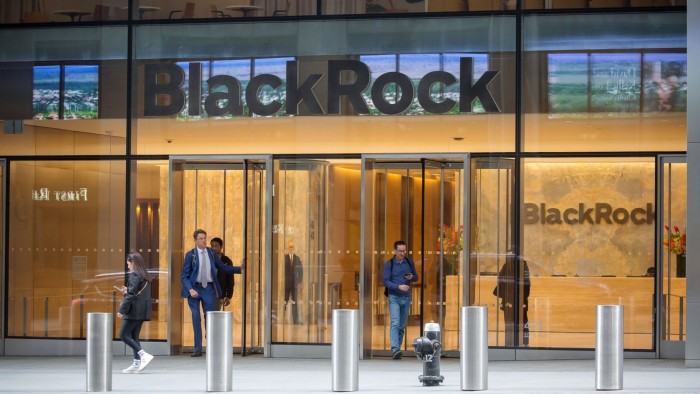Vanguard and rivals gain ground on BlackRock in US ETF market

Simply sign up to the Exchange traded funds myFT Digest -- delivered directly to your inbox.
BlackRock’s lead in the US exchange traded fund market is being eroded by Vanguard and smaller rivals as firms jockey for a larger slice of the $8tn industry.
BlackRock’s iShares managed about 32 per cent of the US ETF market as of November. That compared with 33.7 per cent in late 2022 and was down more than 7 percentage points from the end of 2018, when the $9.1tn asset manager controlled nearly two out of every five dollars invested in US ETFs, according to data from Morningstar Direct.
While BlackRock’s iShares line-up aspires to “be everything to everyone”, Vanguard’s ETF suite “takes a different take” by focusing only on stocks and bonds while leveraging the group’s reputation for low-cost, broad-based strategies, said Bryan Armour, Morningstar’s director of passive research for North America.
“When iShares competes directly with Vanguard on cost, like S&P 500 or total stock market ETFs, investors still reach for Vanguard’s ETF because those cheap, broad-market index funds are what [Vanguard is] best known for. And cheap index funds have been on fire in terms of flows,” he said.
The market share erosion suffered by the world’s largest asset manager in the US stands in contrast to BlackRock’s success in Europe. There, the firm’s ETF line-up has maintained a steady 44 per cent share of the $1.7tn market over the past five years, putting it head and shoulders above its competitors.
Asked for comment on the market share trends, BlackRock pointed to its $220bn in global inflows in 2022 and said it was on pace to be a global inflows leader again in 2023.
“We are proud to see that clients globally — from first-time investors to large active asset managers — continue to entrust iShares with more of their new assets than any firm to meet their investment needs, whether for liquidity instruments or core allocation tools,” a BlackRock spokesperson said.
BlackRock has built on a first-mover advantage in Europe-domiciled ETFs by developing a web of relationships with institutions there, said Debbie Fuhr, founder of ETFGI, a consultancy. Retail investing is also far more prominent in the US than in Europe, where institutional clients that know BlackRock hold greater sway, she said.
“They have an approach where they’re both global and local.”
Vanguard has increased its share of the US market from about 25 per cent to about 29 per cent since 2018. A spokesman said the firm would “continue to take a thoughtful approach to product development to build on an ETF line-up that has earned clients’ trust”.
Behind iShares and Vanguard in the US ETF market, State Street Global Advisors has slipped from almost 17 per cent in 2018 to just under 15 per cent as of December 2023 while Invesco has crept from 5 per cent up nearly to 6 per cent, according to Morningstar.
Two less established players, JPMorgan and Dimensional Fund Advisors, have aggressively developed their ETF line-ups in recent years to reach combined control of 3 per cent of the US market, up from less than 1 per cent in 2018, when DFA did not offer a single ETF. Both firms have converted existing mutual funds to ETFs, a process that allows funds to build on existing asset bases instead of starting from scratch.
The European ETF market has grown from about $765bn at the end of 2018 to more than $1.7tn. Besides iShares, Amundi (now at 12.7 per cent) and DWS’s Xtrackers (10.1 per cent) hold sizeable shares of the market, with Vanguard managing about 6.6 per cent, according to data from ETFGI.
“Competition is growing in Europe, and the competition in the US is very high to get to clients,” Fuhr said.
Comments